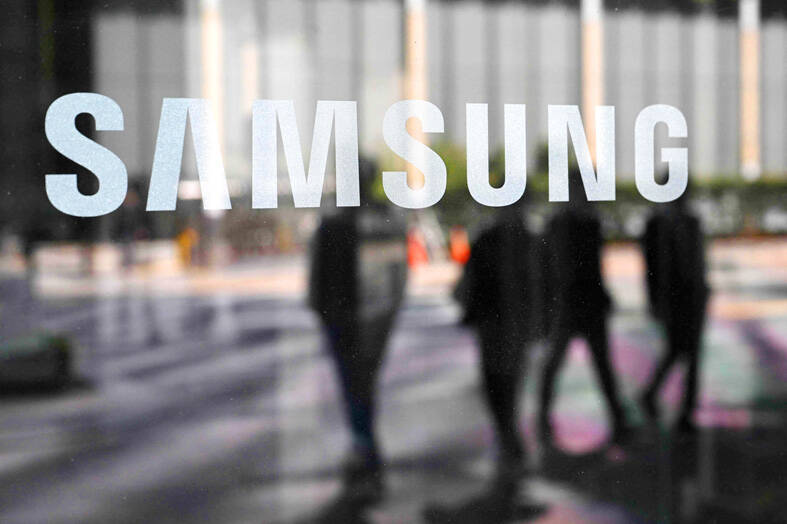Samsung Electronics Co’s chip business reported a roughly 40 percent drop in profit after US export controls dented sales of its high-end chips, even as it seeks to catch up in the lucrative artificial intelligence (AI) memory arena.
March-quarter operating profit at Samsung’s chip segment tumbled to 1.1 trillion won (US$770 million) on erosion in average selling price, as well as a drop in sales of its key high-bandwidth memory (HBM) chips due to export controls, the company said in a statement.
Some clients also deferred orders in anticipation of upcoming enhanced HBM3E products, it said.

Photo: AFP
Those outweighed a boost from Chinese customers stockpiling chip supplies ahead of US tariffs.
“Samsung is planning to ramp up the enhanced 12-layer HBM3E product in the second quarter to meet demand from some clients,” Hyundai Motor Securities Co analyst Greg Noh said. “But unless there is demand from Nvidia, it’s difficult to expect dramatic improvement in the chip business.”
South Korea’s largest company faces mounting challenges in its HBM business. The company has struggled for months to secure Nvidia Corp’s final nod for its most advanced HBM products, which are today the most lucrative segment for memory makers. Icheon, South Korea-based SK Hynix Inc retains the top position in providing these chips to enable AI accelerators.
That catch-up effort continues to eat away at Samsung’s earnings. It spent 9 trillion won in research and development in its fiscal first quarter, up 16 percent from a year ago.
The grim numbers come even as Samsung benefited from a rebound in demand for PC memory and smartphones, two of its key sales drivers.
Customers from Apple Inc to Lenovo Group Ltd (聯想) hastened shipments to the US over the first quarter of the year to preempt tariffs by US President Donald Trump. Samsung’s own Galaxy S25 flagship smartphone series also buoyed earnings. That helped boost the company’s net income to 8.03 trillion won for the March quarter, above estimates.
However, such one-time pretariff gains do little to assuage concern about long-term demand.
Global trade tensions “make it difficult to predict future performance,” the company said in a statement.
If uncertainties fade, Samsung expects performance to improve in the second half of the year, it said.
Within Samsung’s semiconductor division, the contract chipmaking business has struggled, weighed down by a lack of significant orders from major clients.
This has made it harder to compete with Taiwan Semiconductor Manufacturing Co (TSMC, 台積電), which held a dominant market share of almost two-thirds of the global foundry market in the third quarter of last year, according to Taipei-based market researcher TrendForce Corp (集邦科技).
Samsung’s share stood at 9.3 percent.
That foundry business now aims to begin mass production using 2-nanometer processes in the June quarter, a key step in its bid to catch up to TSMC and capture some of the high-end logic chipmaking business.

The Eurovision Song Contest has seen a surge in punter interest at the bookmakers, becoming a major betting event, experts said ahead of last night’s giant glamfest in Basel. “Eurovision has quietly become one of the biggest betting events of the year,” said Tomi Huttunen, senior manager of the Online Computer Finland (OCS) betting and casino platform. Betting sites have long been used to gauge which way voters might be leaning ahead of the world’s biggest televised live music event. However, bookmakers highlight a huge increase in engagement in recent years — and this year in particular. “We’ve already passed 2023’s total activity and

Nvidia Corp CEO Jensen Huang (黃仁勳) today announced that his company has selected "Beitou Shilin" in Taipei for its new Taiwan office, called Nvidia Constellation, putting an end to months of speculation. Industry sources have said that the tech giant has been eyeing the Beitou Shilin Science Park as the site of its new overseas headquarters, and speculated that the new headquarters would be built on two plots of land designated as "T17" and "T18," which span 3.89 hectares in the park. "I think it's time for us to reveal one of the largest products we've ever built," Huang said near the

China yesterday announced anti-dumping duties as high as 74.9 percent on imports of polyoxymethylene (POM) copolymers, a type of engineering plastic, from Taiwan, the US, the EU and Japan. The Chinese Ministry of Commerce’s findings conclude a probe launched in May last year, shortly after the US sharply increased tariffs on Chinese electric vehicles, computer chips and other imports. POM copolymers can partially replace metals such as copper and zinc, and have various applications, including in auto parts, electronics and medical equipment, the Chinese ministry has said. In January, it said initial investigations had determined that dumping was taking place, and implemented preliminary

Intel Corp yesterday reinforced its determination to strengthen its partnerships with Taiwan’s ecosystem partners including original-electronic-manufacturing (OEM) companies such as Hon Hai Precision Industry Co (鴻海精密) and chipmaker United Microelectronics Corp (UMC, 聯電). “Tonight marks a new beginning. We renew our new partnership with Taiwan ecosystem,” Intel new chief executive officer Tan Lip-bu (陳立武) said at a dinner with representatives from the company’s local partners, celebrating the 40th anniversary of the US chip giant’s presence in Taiwan. Tan took the reins at Intel six weeks ago aiming to reform the chipmaker and revive its past glory. This is the first time Tan